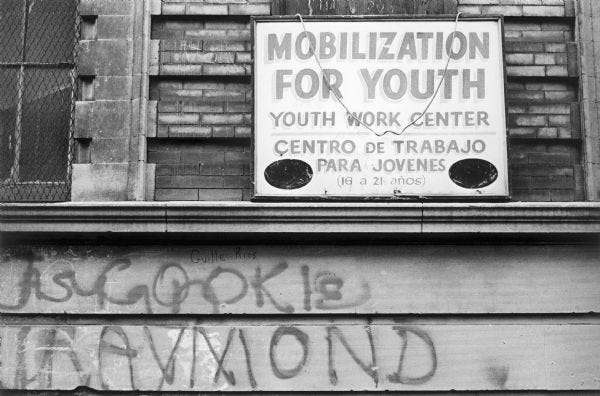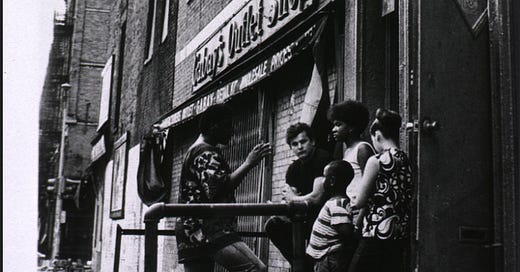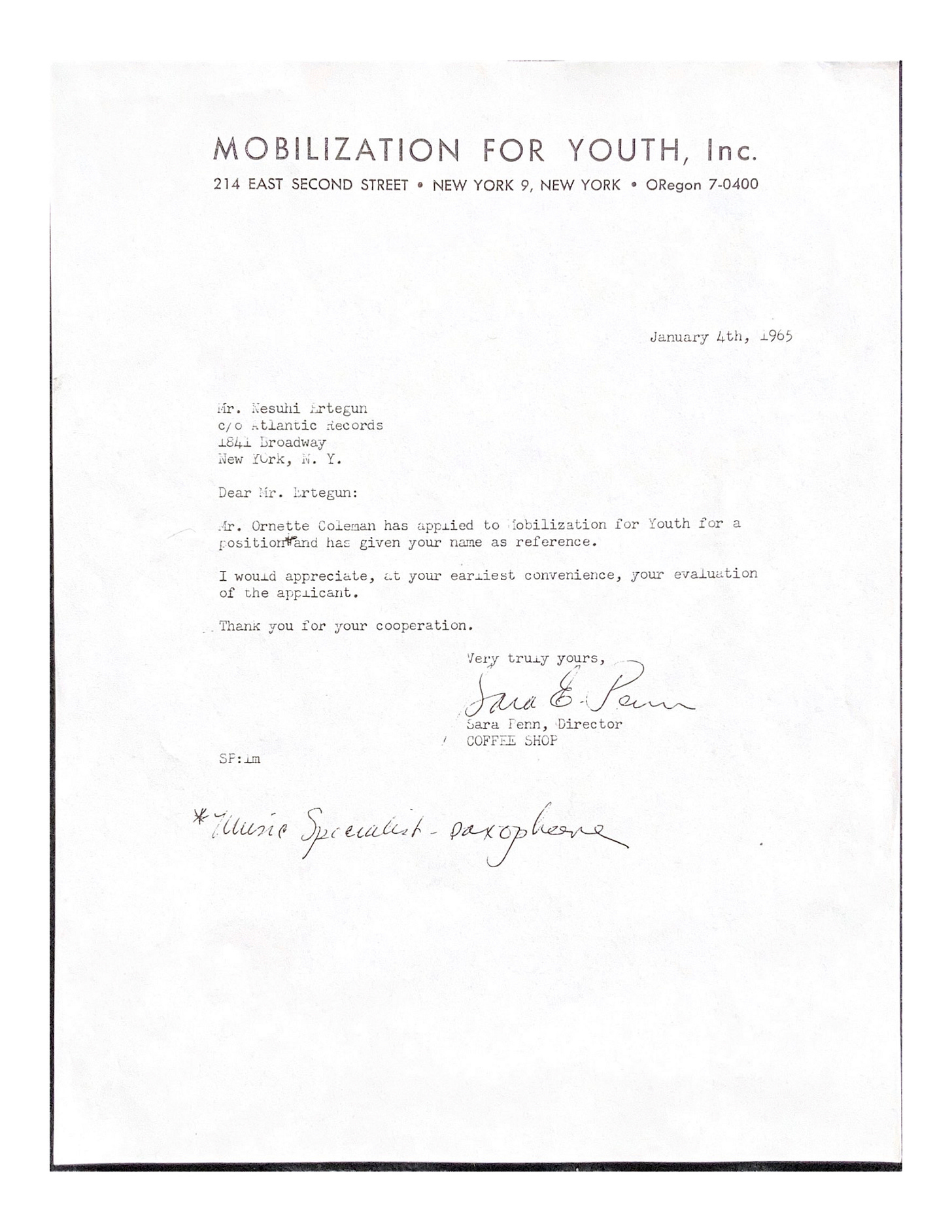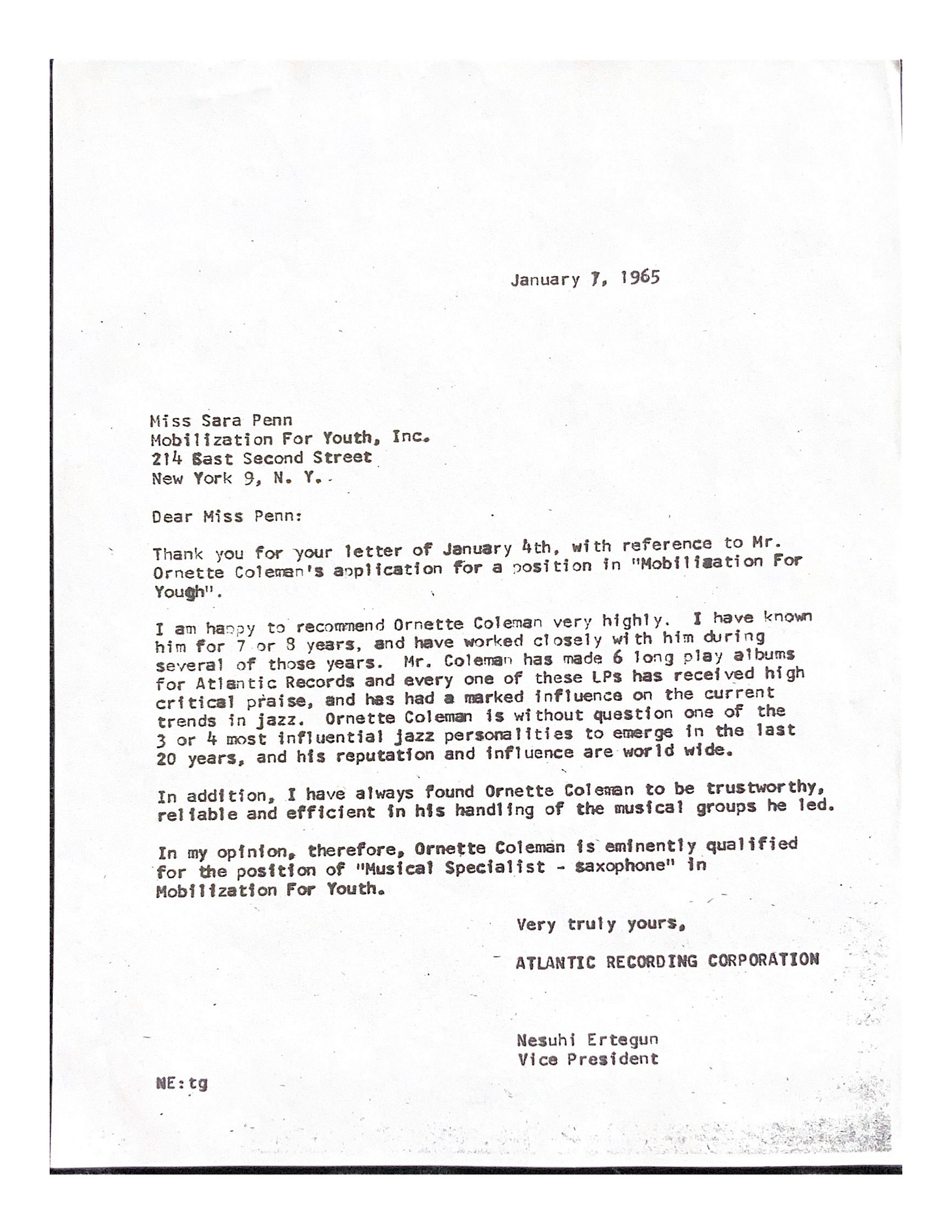(Paying subscribers, scroll down as usual for your bonus.)
I knew and loved Ornette Coleman. He was, in addition to being one of the most influential musicians ever, a kind, thoughtful, and unassuming person. So it didn’t surprise me to learn that in January 1965 he applied to become a “Music Specialist—Saxophone” at the social service organization Mobilization For Youth (MFY). But this has never been mentioned in any writing about him.
Mobilization For Youth, funded by the federal U.S.A. government, began programs in the Lower East Side of Manhattan, New York City, in the summer of 1962. The programs hoped to reduce juvenile delinquency by providing youth employment and training, and presenting cultural, athletic, social and recreation activities. At that time the main population of the Lower East Side consisted of over one-third Italians and other Christian whites, about one-fourth Jews, one-fourth Puerto Ricans, and less than one-tenth Blacks, all living under conditions of poverty. If MFY was successful in New York City, the government hoped to build the program in other cities. Here are photos of two of its offices:


As it happened, MFY began during a time when Coleman was becoming fed up with the music industry. After his concert at Manhattan’s Town Hall, in December 1962, he played no gigs at all for the next two years. (Downbeat reported that Coleman played on trumpet with John Coltrane’s quartet in January 1964, at the Half Note nightclub, so he did make a public appearance, but that was “sitting in,” unannounced and for free—not a gig.) He was looking for alternatives to the nightclub scene.
Meanwhile, as part of its cultural activities, MFY planned to create “‘cool and jazzy’ coffee shops featuring art and folk music.” (Paying subscribers, this quote comes from a very interesting New York Times report about MFY which is your bonus, below.). Ornette had evidently presented himself to Sara Penn, who ran the coffee shop, and, as part of the usual procedure, she asked for recommendations. Ornette directed her to his former producer at Atlantic Records, Nesuhi Ertegun, with whom he had a good relationship. So Penn sent the following letter on January 4, 1965:
(SP:lm meant “typed for Sara Penn by a person with the initials L.M.” That was standard when a letter was dictated to an office staff person, and was not directly typed by the person who signed it.)
On January 7, Ertegun responded as follows:
Did Ornette ever perform for MFY? I can’t find any evidence that he did. And just a few days later, or maybe even the next day, Friday January 8 (I haven’t confirmed the exact date yet), Ornette performed at the Village Vanguard, his first gig in two years. In those days gigs were often set up (and sometimes canceled) at very short notice, so it’s possible that Ornette contacted the Vanguard after applying to MFY. It’s also possible that he already knew that he’d be at the Vanguard, but wanted to look into a different kind of venue for the future.
Most jazz clubs back then presented two bands, and for the first week Ornette alternated sets with guitarist Jim Hall’s trio. After a week off, Ornette was back at the Vanguard at the end of January, this time opposite the Bill Evans Trio. In the summer of 1965, Coleman took a break from the American scene, and went to London for what turned into a year of performances all over Europe.
And what happened to Mobilization For Youth? It was short-lived, but had a long legacy. In 1964, even before Ornette approached them, MFY staff members had become involved in activism such as rent strikes against slum landlords. The organization was highly criticized for its role in these actions, and was also accused of financial misspending, and of being influenced by Communists (a constant fear in those times). MFY addressed these concerns, but its reputation never fully recovered. Its programs ended by about 1970, and board meetings ended by 1972.
But Mobilization For Youth had succeeded in bringing national attention to serious issues that many people would continue to work on, to this day. And its legal division, MFY Legal Services, which was founded in 1963, still provides invaluable services, under the name Mobilization for Justice.
All the best,
Lewis
Keep reading with a 7-day free trial
Subscribe to Playback with Lewis Porter! to keep reading this post and get 7 days of free access to the full post archives.




